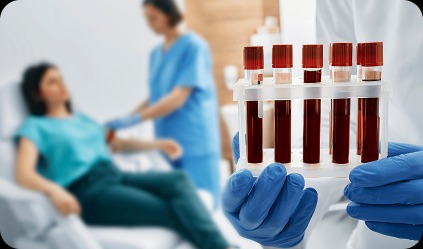Understanding what’s going on inside your body often starts with a simple vial of blood. Thanks to advances in medical science, blood testing has become one of the most reliable methods for detecting a wide range of health conditions—from infections and hormonal imbalances to chronic illnesses like diabetes or kidney disease. These tests provide doctors with valuable insights that can help guide diagnosis and treatment more efficiently than ever before. But how precise are the results? As technology evolves, so does the accuracy and scope of what blood testing can reveal.
Role of Blood Testing in Early Disease Detection
Blood testing plays a critical part in identifying health problems before they become more serious. It allows healthcare professionals to detect changes in the body’s systems that may not yet be producing symptoms. This early insight helps doctors act quickly, often preventing complications or long-term damage. From catching anemia and thyroid disorders to flagging cholesterol issues or liver dysfunction, a simple blood draw can reveal a surprising amount about your health.
Regular screening through blood testing also aids in monitoring risk factors like elevated glucose or inflammation. For patients with a family history of chronic illness, these tests serve as a valuable tool to stay ahead of potential issues. Accurate lab analysis combined with expert evaluation ensures that any concerning patterns are quickly addressed and managed. This proactive approach contributes to more successful long-term outcomes.

How Modern Technology Improves Blood Testing Accuracy
Medical laboratories today rely on advanced equipment to analyze blood samples with a high level of precision. Automation, high-throughput machines, and refined diagnostic techniques help eliminate many of the inconsistencies that were once common in manual testing. These innovations ensure that healthcare providers receive results that are not only fast but also highly reliable.
In addition to speed, modern tools reduce the likelihood of human error in processing or interpretation. Sophisticated analyzers are capable of detecting even slight changes in blood chemistry that could indicate early disease stages. This makes it easier to distinguish between temporary imbalances and underlying medical conditions. As technology continues to advance, the accuracy and scope of blood testing will only become more refined and helpful in clinical decision-making.
Conditions Commonly Diagnosed Through Blood Tests
From common infections to chronic conditions, blood testing is essential in diagnosing a wide variety of health issues. It helps identify imbalances in hormones, vitamin deficiencies, immune response problems, and organ function irregularities. Conditions like diabetes, thyroid dysfunction, kidney disease, and cardiovascular risk factors are frequently confirmed or monitored through routine lab work.
These tests also play a role in detecting cancer markers, autoimmune disorders, and blood-borne infections like hepatitis or HIV. Doctors often rely on patterns in your blood work to understand how well your body is responding to treatment or whether further investigation is needed. Because of its ability to reflect multiple systems in the body, blood testing remains a cornerstone of accurate medical diagnosis across all ages and health stages.
Factors That Affect the Accuracy of Blood Test Results
While blood testing is highly reliable, several factors can influence the accuracy of results. Patient preparation plays a major role—eating, drinking, or exercising before a test can skew results. Medications, hydration levels, and even the time of day a sample is taken may affect values in your blood panel.
In addition to patient-related variables, laboratory procedures also impact accuracy. Proper handling of samples, storage conditions, and analysis timing all contribute to the reliability of the outcome. It’s also essential that the interpreting physician considers the patient’s overall health, lifestyle, and medical history. By accounting for these elements, blood testing remains a dependable tool when performed and analyzed under the right conditions.
Frequency and Timing for Accurate Blood Testing
The timing of blood testing can influence how useful or accurate the results will be. Some tests require fasting for a specific number of hours to ensure the body is in a neutral state. Others may need to be scheduled at certain times of the day due to natural hormone fluctuations, such as cortisol or insulin levels.
Frequency also matters. For individuals managing chronic conditions, regular monitoring through blood testing is essential for adjusting treatment plans or medications. Meanwhile, healthy individuals may only need routine blood panels once or twice a year unless symptoms arise. Discussing with a healthcare provider when and how often to test can lead to more personalized and accurate insights into your health.

Benefits of Combining Blood Tests with Clinical Evaluation
Blood testing provides essential data, but it’s most powerful when paired with a detailed clinical evaluation. A physician interprets lab results in context—factoring in your symptoms, medical history, and physical examination findings. This combination helps ensure that no important detail is overlooked when determining a diagnosis or treatment path.
Sometimes, a blood result may fall just outside of the normal range but may not indicate a real issue. Likewise, values within the standard range might still require attention if they differ from a patient’s baseline. When blood testing is used alongside clinical judgment, it creates a more complete picture of health, leading to safer and more informed decisions about care.
How Laboratories Ensure Reliable Blood Test Analysis
Laboratories follow strict procedures and quality controls to maintain consistent and accurate blood testing results. These protocols include calibrating machines regularly, conducting internal audits, and adhering to standardized methods. Each test goes through a series of checks before the final report is issued to ensure it meets medical and scientific benchmarks.
Additionally, lab technicians are trained to recognize any abnormalities or issues during processing. Many labs also participate in external review programs to validate their performance against industry standards. These efforts are vital in delivering dependable results that physicians can trust for diagnosis and treatment. Trustworthy lab processes are a foundational part of modern healthcare.
Patient Role in Supporting Blood Test Accuracy
What patients do before and after a blood draw can influence the outcome of their tests. Following pre-test instructions—such as fasting, avoiding alcohol, or timing medications—is critical to receiving accurate results. Hydration can also affect the ease of the blood draw and the quality of the sample.
Post-test actions matter too. Patients should ensure they receive and understand their results, ask questions if anything is unclear, and follow up with any recommended care. Keeping an open line of communication with their healthcare provider ensures nothing is missed. By actively participating, individuals contribute to the success and accuracy of their own blood testing process.
The Future of Blood Testing in Diagnostic Medicine
Blood testing is continuously evolving as medical technology advances. New biomarkers are being discovered, making it possible to detect illnesses even earlier than before. Liquid biopsy tests, for example, are now being developed to spot cancer through a simple blood sample, eliminating the need for more invasive procedures.
Innovations are also focusing on improving accessibility and speed. Mobile testing units, at-home kits, and instant result platforms are on the rise, bringing convenience to patients without sacrificing reliability. With these developments, blood testing is set to become an even more vital part of preventive and personalized healthcare, helping patients stay informed and healthier over time.
Conclusion
Staying proactive about your health means knowing when to take advantage of reliable diagnostic tools like blood testing. At Urgent Care USA in Plant City, FL, our skilled medical team is here to provide fast, accurate lab services to help detect and monitor a wide range of conditions. Whether you need routine screening or quick answers to health concerns, we make the process smooth and stress-free.
Walk in without an appointment and receive compassionate, efficient care tailored to your needs. Blood testing is a smart step toward managing your well-being, and we’re here to help you every step of the way. For more information or to speak with a member of our team, contact Urgent Care USA today at (813) 752-7222. We’re ready when you need us—no long waits, just dependable care close to home.
